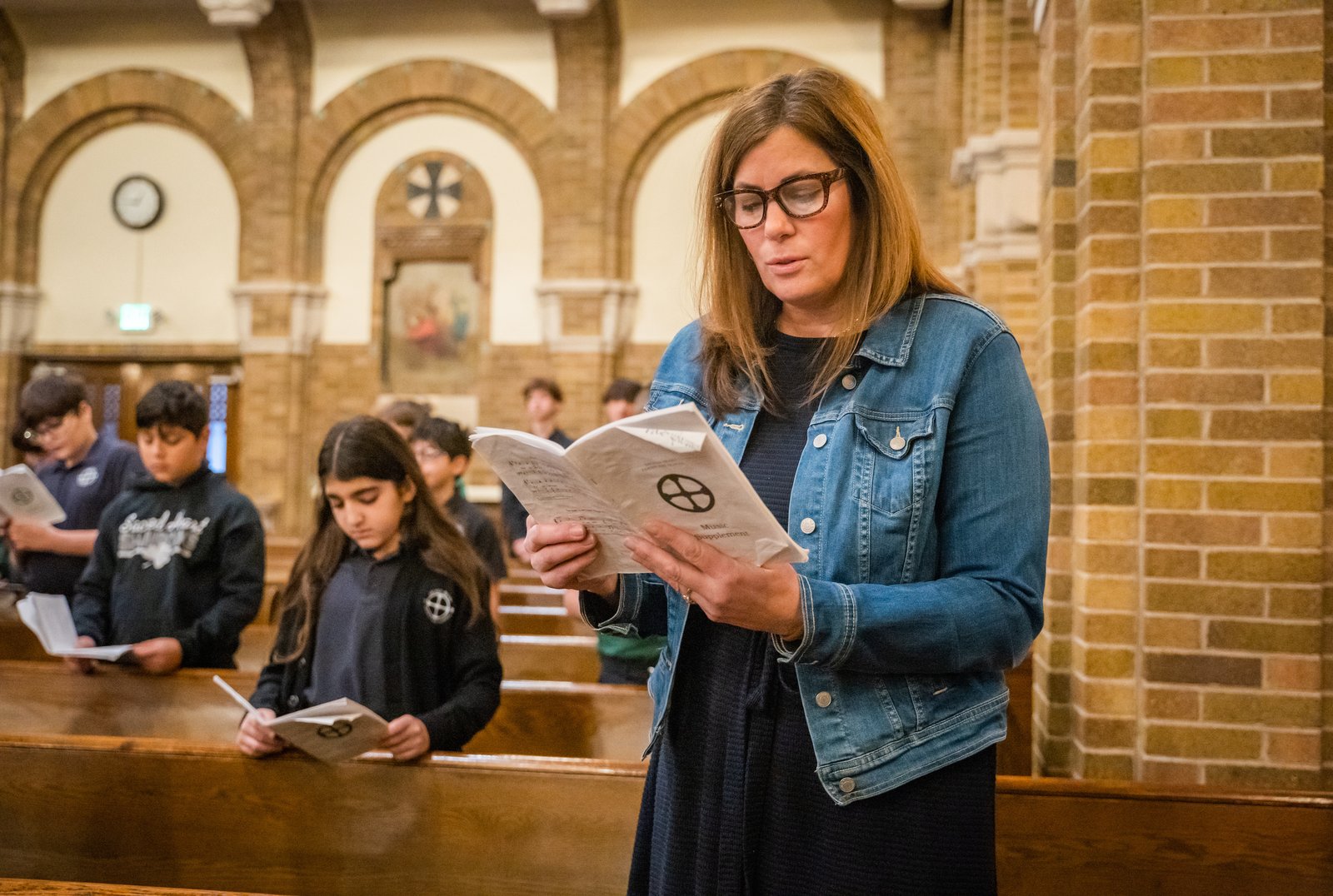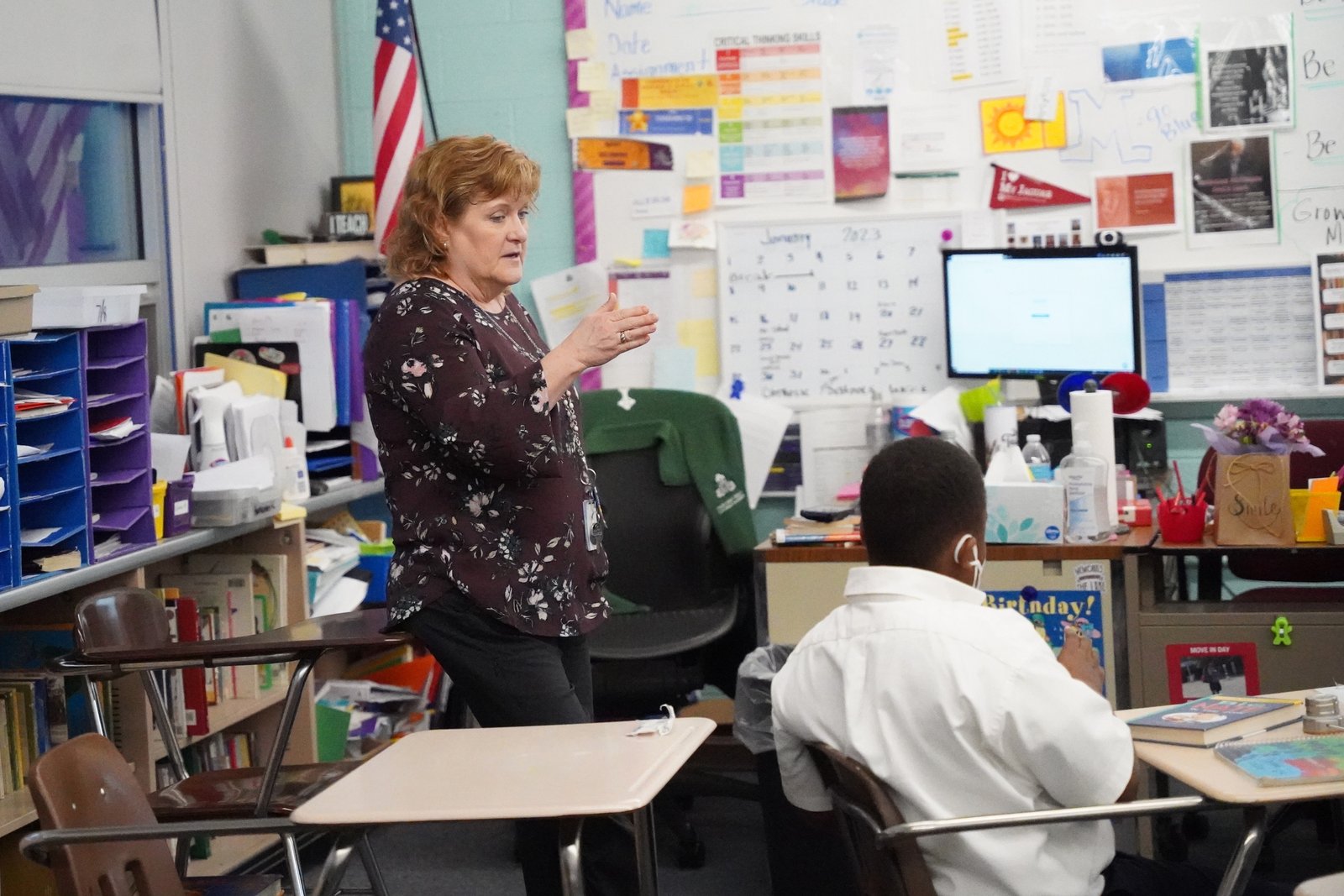Smaller class sizes, fewer mandates, and an opportunity to teach and collect a pension are cited as major differences for educators
DEARBORN — Kim Ayrault knew she needed a change of scenery, but she wasn’t ready to stop teaching.
She spent 26 years in the Eastpointe Community School District in Macomb County, teaching kindergarten and second grade, as well as being an instructional coach and an assistant principal.
She loves teaching and being around kids, but something felt off. So she began browsing the Archdiocese of Detroit’s careers page, where she discovered Sacred Heart School in Dearborn was looking for a principal.
“I was drawn toward working in a situation with my Catholic beliefs. Attending Mass and praying at school attracted me,” Ayrault told Detroit Catholic. “I had a great conversation with Fr. Ken (Chase, priest in solidum of the Hope Renewed Family of Parishes, who primarily serves at Sacred Heart). I felt like I’d known him my entire life. He is just amazing; we had this really long meeting of talking and laughing and then he offered me the job.”
Ayrault said the change has been a breath of fresh air in her teaching career, going to Mass with students, working in a small school community, and having the opportunity to connect with students on a more individual basis.
Ayrault was vested in the Michigan public schools pension system for her time at Eastpointe, which made the move to Sacred Heart possible for her family.

“I have a large family, and I wouldn’t be able to do this without my pension,” Ayrault said. “When Fr. Ken offered me the job, he was cringing, saying we’d love to have you here, but I don’t think this is enough. Thankfully, my pension makes up for my salary.”
Ayrault is among a growing number of teachers from public schools considering a move to Catholic schools, drawn in by the atmosphere of prayer, smaller class sizes, and a more supportive community environment, said Deacon Sean Costello, superintendent of Catholic schools for the Archdiocese of Detroit.
“We’re watching a trend or increase in teachers interested in making the jump to Catholic schools, especially those close to retirement who are able to walk away from public schools and teach in our schools, so they can take their pension with them,” Deacon Costello said. “It’s an opportunity for them financially, and for them to get back to the kind of teaching that they got into teaching for in the first place.”
By coming to a Catholic school, teachers aren’t affecting their pension. So it’s possible for teachers to retire from the public school system, work at a Catholic school and then draw upon their pension as a way to supplement their income and make up for the difference between public school teaching salaries and Catholic school teaching salaries, Deacon Costello said.
“The are coming into our system, setting up a pension through the Michigan Catholic Conference, which is what all Catholic employees in the state of Michigan utilize as a pension program,” Deacon Costello said. “If you are 21, coming out of college and into a teaching program in a public school, and you get done at 51 years old, you have the ability to become invested in our pension program as well, walking away at 60 or 65 with two pensions.”
Deacon Costello said Catholic schools also have the advantage of not having as many burdensome tasks and mandates to fulfill compared to their public school counterparts, allowing teachers to “focus more on teaching and less on filling out forms.”

Lynn O’Meara has been teaching at Most Holy Trinity School in Detroit for two years, after spending 35 years at Harper Woods.
“I liked the work I was doing at Harper Woods, but there was an administrative change and it became untenable,” O’Meara said. “Then COVID came, I had two adult children who graduated from college, we were in a pandemic, and my State of Michigan insurance didn’t cover them since they weren’t full-time students. I knew I wasn’t done teaching, so I started looking at Catholic schools jobs because I was at a point where I could afford it.”
O’Meara wanted to stay in an urban setting, so when a job at Holy Trinity, located in Detroit’s Corktown neighborhood, opened up, she applied and became the school's new middle school English and Language Arts teacher.
“When Ms. (Karinia) Lepkowski (principal at Most Holy Trinity) told me we have an opening, but it’s middle school, I thought, 'I'm certified for that,' and went for it,” said O’Meara, who taught kindergarten for the last 14 years at Harper Woods. “I thought I could go for it because I have a pension, so for the first time in my life, I could make choices on my preferences versus what my family needed, so I signed right when they asked.”
O’Meara cites the academic freedom of planning out the curriculum and bringing faith into the classroom as highlights of her time at Most Holy Trinity.
Fellow Most Holy Trinity teacher Mark Mazzon, who teaches fifth- through eighth-grade math, came to Detroit after teaching in the Upper Peninsula in the Bessemer School District for 24 years.
After a 35-year career, Mazzon didn’t want to teach full-time, but wanted a job that could accommodate a morning class schedule from 8 a.m. to noon.

“It’s the best job I’ve ever had,” Mazzon said. “The hours help because I do officiate in the afternoons with football, basketball and track, but they work with me on that,” Mazzon said. “The kids are so respectful, so well-behaved.”
The tight-knit nature of Catholic school communities is another bonus for teachers, particularly when family situations arise when a teacher might need more support than usual, such as when O'Meara lost her father just before Christmas last year. She and her siblings were caring for her dad, but with Christmas break approaching, O’Meara organized a lesson plan for the final three days before the break began, asking if someone could cover for it.
“They had me covered, and didn’t give me any grief over leaving for three days,” O’Meara said. “Fr. Ryan (Adams) came to the viewing and Msgr. (Chuck) Kosanke came to the funeral, along with my principal, academic dean and other teachers came, and I just got all this love and support.
“It’s not that I didn’t have support from people in the public schools, but that was individuals, not the entire community showing up and putting their arms around me,” O'Meara added.
Teachers who spoke to Detroit Catholic cited similar benefits to teaching in a Catholic school. They feel they are no longer pontificating curriculum to the students, but engaging in a dialogue that encourages learning and the personal development of each student as a son or daughter of God.
“Over Christmas break, I had several teachers I know working in public schools who wanted to know if I had any positions for them,” Ayrault said. “I think for me being here, at Catholic schools, it helps me grow in my faith. It gives me a chance every Monday or Wednesday to sneak over for a Mass in the morning. It gives me a whole different perspective to grow in my faith."
Deacon Costello said it is rewarding to hear teachers who have switched to Catholic schools reporting a renewed interest and joy in their profession. It's a testament to the environment Catholic schools create and a boon for getting new families into Catholic schools, he said.
“Happy teachers, energetic teachers create classrooms of excellence, making happy kids who are excited and want to go to school,” Deacon Costello said. “That makes happy parents, and happy parents are key to enrollment at our schools. They talk to our friends and neighbors, to those in the broader community by saying, ‘My kids to go St. Mary’s or St. William’s, and we love our school.’ Families talking about why they love our schools is the greatest testimony we can have, and teachers who find their time teaching in our schools as rewarding help us tell the story of Catholic schools.”
Copy Permalink
Catholic schools












